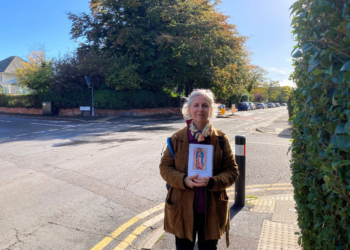Alexander Stafford was the Conservative MP for Rother Valley from 2019 to 2024.
Throughout my time as an MP, Bill Committee meetings were largely uneventful affairs and rarely newsworthy. Clearly this has not been the case for Kim Leadbeater’s Bill Committee for her assisted suicide Bill; barely a sitting goes by without a flurry of news stories following in its wake.
So far, the 12 line-by-line scrutiny sittings of Leadbeater’s Committee have taken up more than thirty hours of Parliamentarians’ time. Of the 43 clauses contained within the Bill, the Committee has concluded debate on seven – very nearly eight – clauses.
Whilst initial progress in committee was slow, with debate on clause one taking just over 11 hours, progress has accelerated rapidly since then, with the next six clauses being dispatched in less than twice the time.
Whilst it seems increasingly likely that the Bill will conclude committee in time for an anticipated Report Stage on 25 April, the accelerating progress does raise questions as to whether the rigorous scrutiny we have consistently been promised by the Bill sponsor can be effectively delivered.
As I’ve said previously, I’m strongly opposed to Leadbeater’s Bill and, if I were still an MP, I would have voted against it at Second Reading without hesitation.
I was hoping, however, that should it proceed, it would be made as safe as possible and, accordingly, that it would be subject to intense scrutiny, with additional safeguards added and the existing ones strengthened.
I had also hoped that Leadbeater would approach her role leading the Committee with the utmost sobriety and would look to run a transparent, fair and balanced process which sought to give a platform to all voices, including those who hold deep concerns about the Bill and the consequences it might have for some of the most vulnerable in our society.
Sadly, this does not appear to be what has happened. From what I have seen, Leadbeater’s engagement with opponents’ concerns has been mere lip service, with a listening ear primarily for those in favour of her Bill.
The composition of the Committee, skewed dramatically in favour of the Bill and not helped by the faux-neutrality of ministers, has created an extraordinary echo chamber, despite the best efforts of the small remnant on the Committee determined to effectively engage with the process.
I have always sought to be careful in my choice of words and not to over-egg things, but I must be very clear here, and I make no apology for it: such an approach to an issue of such high stakes involving the lives of some of the most vulnerable within society is an outrage.
Although the Government’s position has clearly greased the skids, ultimately, Leadbeater has chosen to approach this task in the way she has and is responsible for it. What possible justification could she give for how she stacked the list of international witnesses who gave evidence to the Committee?
The Australian states which have introduced laws in this area have only done so recently, and there is limited data available on their experiences, yet Leadbeater ensured that six of her eight international witnesses were from these states. Jurisdictions that do have extensive experience with these laws, such as the Netherlands, Belgium and Oregon, did not have any witnesses giving evidence, and neither was there anyone from Canada.
Professor Theo Boer was absolutely right to state that Leadbeater should have included international witnesses from jurisdictions such as his own.
I would love to hear Leadbeater’s justification for why someone like Professor Boer was not included as a witness. The truth is most likely because he is a traitor to the cause, having initially supported the euthanasia laws in the Netherlands before turning against them after nearly a decade at the coalface in an extremely senior role.
Leadbeater might say that the scheme in the Netherlands bears little resemblance to the scheme she is proposing. But, as Boer explains, it is important to point out that the scheme that was initially proposed in the Netherlands was far different from what is in place today.
Surely it would have been helpful for members of the Committee to have learnt from the Dutch experience and how such schemes can become more permissive over time? Clearly not in Leadbeater’s view.
I followed the debates relating to clause one, the foundational clause of the Bill, particularly closely. All in all, MPs with concerns about Leadbeater’s Bill tabled 80 amendments trying to strengthen safeguards to protect the most vulnerable.
Amazingly, Leadbeater and her allies rejected each and every one of these amendments. After clause one, we were greeted with Leadbeater taking her axe to various amendments targeted at providing security and reassurance to some of the most vulnerable groups in our society.
This included an amendment that was designed to safeguard those with anorexia from being dragged within the scope of Leadbeater’s Bill. Indeed, there was powerful testimony at the evidence sessions from Chelsea Roff, a researcher who works to help people overcome eating disorders, where she outlined how a number of young women around the world with eating disorders have been euthanised or died by assisted suicide.
Unbelievably, the amendment was rejected – again, I wonder why Leadbeater continues to resolutely refuse to listen and to learn from overseas experience. Also rejected was an amendment to clearly safeguard those with diabetes from qualifying under the terms of the Bill.
The Committee moved on to consider an amendment tabled by Damien Hinds, and supported by more than 50 organisations, focused on supporting people with Down’s Syndrome. The amendment was a simple one: to ensure that the needs of people with Down’s Syndrome are accounted for in any possible initial discussion of assisted suicide with a doctor.
Surely, here was an amendment all reasonably minded MPs could get behind? No. This amendment, too, was dismissed, as was an amendment seeking similar regard for people with autism and learning disabilities.
As a former MP having sat on multiple bill committees, I struggle to understand how the sponsor of the Bill could not find a way to meaningfully engage and address these concerns by making explicit provision in it.
As well as being a tactical misstep, whatever she may say about her Bill giving broad safeguards that make specific provisions such as these unnecessary, Leadbeater has missed the point entirely. Vulnerable people are fearful, and she is failing to meet them in their vulnerability and assuage those fears.
I have followed the progress of Leadbeater’s Bill with bafflement. From talking to former colleagues, it seems that many MPs are of a similar view and are turning against the Bill. I really hope, following the scandalous goings-on throughout the Committee stage, that enough MPs who voted for the Bill at Second Reading change their minds and vote against it at Third Reading.
Whatever your view on the principle, if the experience of the Committee to date is any indicator then this process is clearly not going to produce safe – or even good and workable – legislation. It simply must be rejected.






![Trump's Admin Guts Another ‘Rogue Government Agency with Zero Accountability’ [WATCH]](https://www.right2024.com/wp-content/uploads/2025/03/Trumps-Admin-Guts-Another-‘Rogue-Government-Agency-with-Zero-Accountability-350x250.jpg)
![‘We All Owe Him (Elon) a Huge Debt of Gratitude’ [WATCH]](https://www.right2024.com/wp-content/uploads/2025/03/‘We-All-Owe-Him-Elon-a-Huge-Debt-of-Gratitude-350x250.jpg)


![NCAA Champ Salutes President Trump After ‘BIGGEST UPSET IN COLLEGE WRESTLING HISTORY’ [WATCH]](https://www.right2024.com/wp-content/uploads/2025/03/NCAA-Champ-Salutes-President-Trump-After-‘BIGGEST-UPSET-IN-COLLEGE-350x250.jpg)






